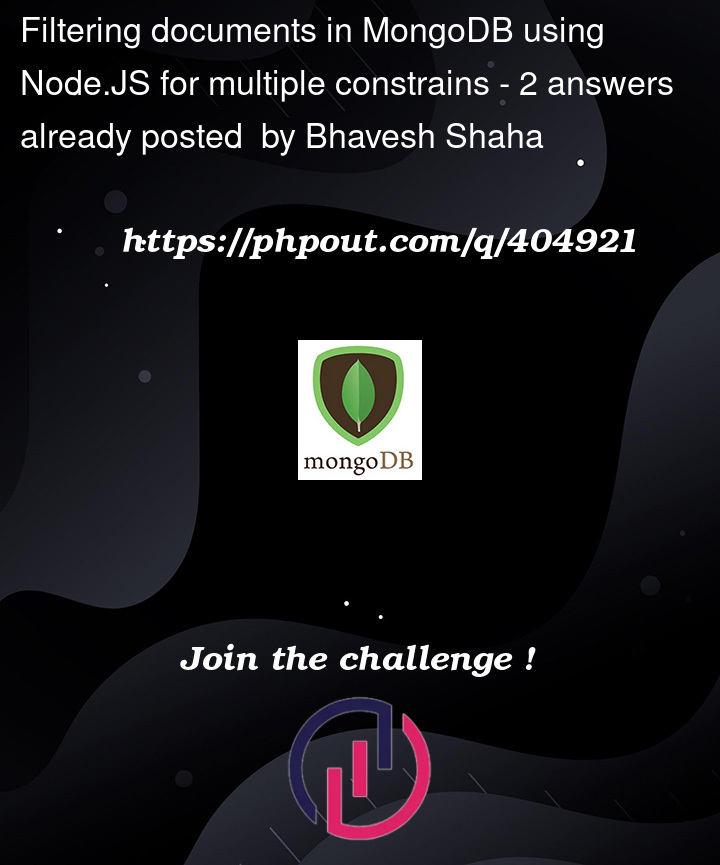I have 1000 questions (each as a document) in questionBank collection.
Each question has its own document-id, a subject key (s1, s2, s3, s4, ... ,s10) and difficult key (easy, medium, hard).
My objective is to fetch exactly 15 questions among these such that the following constraints are met:
- Subject: Questions from
s1, s2, ..., s5subjects (each) shouldn’t exceed 2. Questions froms6, s7, ..., s10subjects (each) shouldn’t be more than 3. - Difficulty: We want a maximum of 40% easy questions, a maximum of 75% medium questions, and a maximum of 40% hard questions. (right now, we are randomly generating the number of questions per difficulty).
- Each user has
visitedQuestionscollection where the list of all the questions they’ve already attempted is stored by the document-id, so we also want to refrain using the questions that have been previously attempted.
result = await QuestionBank.aggregate([
{
$facet: {
easyQuestions: [
{
$match: {
difficulty: "Easy",
...criteriaSet,
},
},
{ $sample: { size: difficultyRanges.easy } },
],
mediumQuestions: [
{
$match: {
difficulty: "Medium",
...criteriaSet,
},
},
{ $sample: { size: difficultyRanges.medium } },
],
hardQuestions: [
{
$match: {
difficulty: "Hard",
...criteriaSet,
},
},
{ $sample: { size: difficultyRanges.hard } },
],
},
},
{
$project: {
questions: {
$concatArrays: [
"$easyQuestions",
"$mediumQuestions",
"$hardQuestions",
],
},
},
},
{
$unwind: "$questions",
},
{
$group: {
_id: "$questions.subTopic",
questions: { $push: "$questions" },
count: { $sum: 1 },
},
},
{
$match: {
$or: SAToicLimits,
},
},
{
$limit: 15,
},
]);
let resres: any = [];
for (let i = 0; i < result.length; i++) {
resres = [...resres, ...result[i].questions];
}
result = resres;
if (result.length === 15) {
break;
}
Note: SAToicLimits has the name of the subjects and the respective limits.
What is the most efficient way to go about it?




2
Answers
I don’t think you can achieve this by an aggregation pipeline only.
My proposal would be this one: First create a random order of documents. This you can do by sorting by a hash value. Using
$dateToString: { date: "$$NOW" }guaranties that the order is different for each call (unless executed multiple times within one millisecond). You could also use a static value (e.g.a,b,c) to get a random order which is deterministic.Then create kind of bucket-list. Fill the bucket one-by-one till all constraints are done:
You can do the followings in the aggregation pipeline:
$lookupto thevisitedQuestionscollection and$matchwith theuserIdfor the user that you are targeting$matchto check for no result is looked up fromvisitedQuestions. That means the question is not visited by the user.$seta random key for every questions$setWindowFieldsto computesubjectRankwith$rankin the partition ofsubjectand order by therandomKeywe generateddifficulty, to computedifficultyRank$seta boolean/flagqualified, with the following criteria, in a$andmanner:subjectis in s1 – s5, we yield the result ofsubjectRank<= 2subjectis in s6 – s10, we yield the result ofsubjectRank<= 3difficultyis easy, we yield the result ofdifficultyRank<= 15 * 40% = 6difficultyis medium, we yield the result ofdifficultyRank<= 15 * 75% = 11.25difficultyis hard, we yield the result ofdifficultyRank<= 15 * 40% = 6qualifiedflag, we know which question can be picked by$match: {qualified: true}$sample15 questions$unsetthe helper fieldsMongo Playground